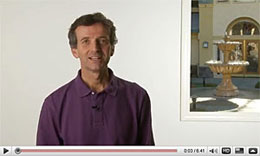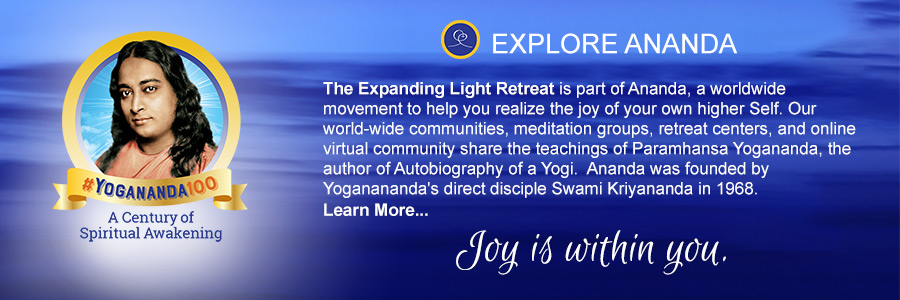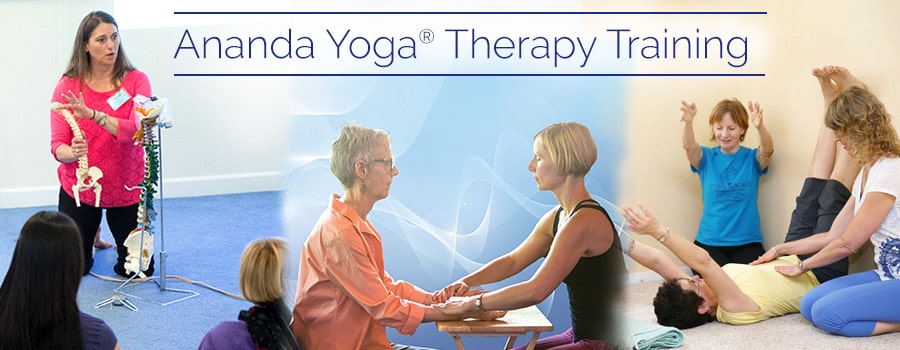SYLLABUS
Online Ananda Yoga® Assistantship
We are not currently accepting new students in the Ananda Yoga Therapy Training
Course Contact Hours: 72
Prerequisite
Completion of Ananda Yoga® Teacher Training (200-hour), or Bridge to Ananda Yoga and approximately 30 hours of teaching Ananda Yoga after graduation.
Teaching Format
This is a 4 week online course that includes a combination of lecture, demonstration, online discussion, as well as videoed and mentored hands on or distanced practice assisting and adjusting practicums. There are also written and video review assignments and quizzes.
Course Description
The content of this course is centered around principles and techniques of assisting and adjusting for over 30 Ananda Yoga poses. We review anatomy and physiology and common injuries and vulnerabilities that require special consideration when keeping a student safe and comfortable in asanas. Participants will learn to adapt poses for individual needs, plus have ample opportunity for mentored experience as a therapeutic assistant with volunteer clients in their community.
NOTE: During the COVID 19 outbreak we strongly recommend following CDC guidelines when in engaging with volunteer students – screen teacher and students for fever, symptoms or recent contact with infected persons, maintain physical distance when possible, use masks and gloves when in close contact, frequently disinfect any shared surfaces, wash hands frequently and avoid touching your face.
Class size is limited to make sure each participant has mentored practice and personalized feedback by the faculty. This course is a foundation for the skills needed to function effectively as an Ananda Yoga Therapist.
Faculty: Certified Meditation Teachers
Maitri Jones RN, E-RYT 500, Ananda Yoga Therapist, C-IAYT, Ananda Minister
Michele Tsihlas, E-RYT 500, Ananda Yoga Therapist, C-IAYT, Certified Personal Trainer
Melody Hansen, E-RYT-500, Ananda Yoga Therapist, C-IAYT
Required Texts/Reading Materials
Ananda Yoga Assistantship Manual .The Expanding Light, 2018
Ananda Yoga Teacher Training Manual. The Expanding Light, 2018
Learning Objectives
At the completion of the course students will know:
- How to recognize misalignment in a wide variety of yoga asanas
- How to keep yoga students safe and prevent potential injury in yoga practice
- How and why modify yoga poses for specific health conditions
- How to use verbal, visual and touch assistance to adjust students in yoga poses
- Appropriate and effective touch techniques
- How to help students understand their own body mechanics and learn to self adjust
- How to use props to enhance safety and depth of experience in the poses.
- Methods to help students learn experience more physical and energy depth in asanas
- How to create a therapeutic rapport between teacher and student
Subject Matter/IAYT Competencies Covered:
Section 1. Yoga Foundations
Category 1.1. Yoga Teachings and Philosophy
1.1.1 Familiarity with the evolution of the teachings and philosophy of the yoga tradition and its relevance and application to yoga therapy, including teachings from Vedic and post-Vedic periods, Samkhya,Yoga,Tantra, and Ayurveda. Examples of concepts and models from the above teachings and philosophy relevant to yoga therapy, include but are not limited to,
a. tanmatra/bhuta/indriya (subtle element/gross elements/senses);
b. purusha/prakrti (consciousness/material world);
c. pancamaya kosha (dimensions of the human system);
e. duhkha (suffering/discomfort).
Category 1.2. Yoga and the Mind
1.2.1 Knowledge of yoga perspectives on the structure, states, functioning, and conditions of the mind, including, but not limited to,
1.2.1.1 drashtr (seer), drshya (seen);
1.2.1.2 antahkarana citta (consciousness), buddhi (intellect), ahamkara (ego), manas (mind);
1.2.1.5 states of mind:mudha (stupefied/dull), kshipta (disturbed), vikshipta (alternating between distraction and focus), ekagrata (one-pointed), nirodha (focus enveloped/held/ restrained), vaishvanara (waking), taijasa (dream), prajña (deep sleep), turiya (beyond).
Section 2. Biomedical and Psychological Foundations
Category 2.1. Anatomy and Physiology
2.1.1 Knowledge of human anatomy and physiology, including all major systems of the body and their interrelationships, as relevant to the work of a yoga therapist.
2.1.2 Knowledge of biomechanics and movement as they relate to the practice of yoga and the work of a yoga therapist.
2.1.3 Knowledge of common pathologies and disorders of all the major systems, including symptoms, management, illness trajectories, and contraindications, as relevant to the work of a yoga therapist.
Category 2.2. Additional Biomedical Knowledge
2.2.1 Familiarity with commonly used drugs and surgical procedures, as relevant to the work of a yoga therapist.
2.2.2 Familiarity with common medical terminology.
2.2.3 Knowledge of how to reference current healthcare information relevant to the work of a yoga therapist, including pathologies, disorders, drugs,
Category 2.5. Body and Mind Integration 2.5.1 Knowledge of the interaction of the body, breath, mind, intellect, and emotions in health and well-being.
Category 3.1. Yoga Therapy Tools
Section 3. Yoga Therapy Tools and Therapeutic Skills
Category 3.1. Yoga Therapy Tools
3.1.2 In-depth knowledge of the range of yoga practices and their potential therapeutic effects for common conditions Practices may include, but are not limited to,
3.1.2.1 asana (postures);
3.1.2.2 pranayama (regulated breathing);
3.1.3. Demonstrated ability to recognize and manage the subtle dynamics inherent in the therapist/client relationship.
Category 3.2. Basic Principles of the Therapeutic Relationship
3.2.1. In-depth knowledge of, and observed capacity for, well-developed communication skills: listening, presence, directive and non-directive dialogue.
3.2.2. Demonstrated ability to recognize, adjust, and adapt to specific client/student needs in the evolving therapeutic/professional relationship.
3.2.3. Demonstrated ability to recognize and manage the subtle dynamics inherent in the therapist/client relationship.
Category 3.3. Principles and Skills for Working with Groups
3.3.1. In-depth knowledge of and demonstrated ability to implement effective teaching methods, adapt to unique styles of learning, provide supportive and effective feedback, acknowledge the client's/student's progress, and cope with unique difficulties/successes.
3.3.2. In-depth knowledge of and demonstrated ability to transmit the value of self-awareness and self- responsibility throughout the therapeutic process.
3.3.3. In-depth knowledge of and demonstrated ability to develop and adjust appropriate practice strategies to the client/student.
Category 3.4. Principles and Skills for Working with Groups
3.4.2. Familiarity with group dynamics and techniques, including communication skills, time management, and the establishment of priorities and boundaries, as well as techniques to address the specific needs of individual participants, to the degree possible in a group setting.
Section 5. Professional Practice
Category 5.1. Ethical Principles
5.1.1. In-depth knowledge of yoga practices and methods for self-inquiry related to establishing, practicing, and maintaining ethical principles.
5.1.2. In-depth knowledge of generally accepted ethical principles of health care codes of conduct and yoga's ethical principles.
Category 5.4. Personal and Professional Development and Continuing Education
5.4.1 Knowledge of the fundamental value of ongoing personal practice, long-term mentorship, and skills maintenance/development through continuing education.
5.4.2 Knowledge of when and how to seek advice and support for case consultation, educational advancement, and personal practice.
Course Completion Requirements
Students have demonstrated understanding of course learning objectives by their supervised practicum, attendance at all classes, participation in all discussions and workshops. Completion of required reading. Understanding of assisting principles and techniques as demonstrated in hands on practicums and review sessions and quizzes.
Ananda Yoga Therapy Training
- Overview
- Flow Chart of Ananda Yoga® Therapy Training Courses
- Course Syllabi
- Tuition Costs
- Ananda Yoga® Therapy Training Courses Scheduled
- Frequent Questions
- Instructors
- Apply for Level 1
- Student Handbook with Costs
- Bridge to Ananda Yoga
Upcoming Courses in date order
- Bhagavad Gita Retreat
- The Essence of the Yoga Sutras According to Paramhansa Yogananda
- Ananda Meditation® Teacher Training - In Person
- Advanced Pranayama
- Ananda Yoga® Assistantship
- Ananda Yoga® Therapy Training: Principles
- Ananda Yoga® Advanced Training: Therapeutic Yoga for Seniors and Bone Strength
- Restorative Ananda Yoga® Teacher Training - In Person
- Ananda Yoga® Therapy Training: Musculoskeletal–1
- Ananda Yoga® Therapy Training Online: Ayurveda
- Ananda Yoga® Therapy Training Online: Health Challenges–1
- Ananda Meditation® Solutions
- Ananda Spiritual Counseling® Training - In Person
- Ananda Yoga® Therapy Training: Musculoskeletal–2
- Ananda Yoga® Therapy Training Online: Health Challenges–2
- Ananda Yoga® Therapy Training: Psychology and Mental Health
- Ananda Yoga® Therapy Training: Holistic Health Therapist Training
Nursing CEU Eligible: details coming

How to Choose a
Yoga Teacher Training Program

“My 4 weeks of Ananda Yoga Teacher Training was one of the most fulfilling and spiritually transforming periods in my life. All of the faculty, along with the entire Ananda community, were very supportive and nurturing.” – R. F., Lake Bluff, IL.

Testimonial for the Ananda Yoga Therapy Training Program
“The program is all embracing ˜ asana, ayurveda, chakras, special health issues touching on body, mind, and spirit. The instructors were wonderful, knowledgeable, supportive, and enthusiastic.” – T.C., CA.







The yoga therapy components of these courses are based on our accreditation by IAYT, not derived from our status as an RYS with Yoga Alliance Registry.


CONNECT
14618 Tyler Foote Rd
Nevada City, California 95959
Toll free 800-346-5350
Outside US 530-478-7518
LEARN MORE
SUBSCRIBE
Receive uplifting emails with inspirational content and news about our retreat programs, travels, and trainings.
















